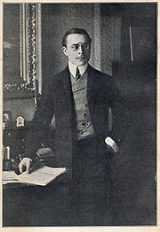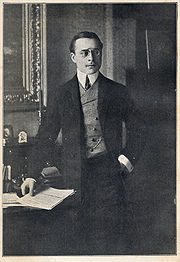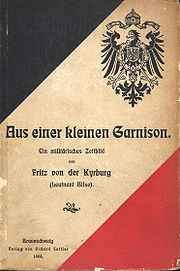
Fritz Oswald Bilse
Encyclopedia
Fritz Oswald Bilse was a German
novelist, playwright
and a lieutenant
in the Prussian Army
. He also used the pseudonym
s Fritz von der Kyrburg and Fritz Wernthal.
 Fritz Oswald Bilse was born in Kirn
Fritz Oswald Bilse was born in Kirn
(present-day Rhineland-Palatinate
, then Prussia
n Rhine Province
), the son of a schoolteacher, and grew up in the towns of Kirn and Eisenach
. He joined the Prussian army in 1896 and in 1900 was posted with the 16. Train-Bataillon at Forbach
in Lorraine
. He rose to instant notoriety with his novel Aus einer kleinen Garnison. Ein militärisches Zeitbild (1903). In later editions, he used the pseudonym "Fritz von der Kyrburg", after his home town's most prominent landmark, the Kyrburg castle.
The book, in which Bilse satirizes the manners of the Forbach garrison and of the Prussian army in general, became a succès de scandale
and was soon reprinted many times. Bilse's criticism, however, was so sharp, and the location and protagonists so little disguised, that several officers who felt their honour to be under attack prosecuted Bilse in a court-martial
, the trial taking place at Metz
from 9. to 13. November 1903. Bilse was found guilty of defamation of character, was discharged from the army dishonourably, and sentenced to six months' imprisonment. His novel was (temporarily) banned.
The scandal only served to enhance Bilse's celebrity. He was henceforth described as the German army's enfant terrible; the novel became popular abroad, especially in France, where the label interdit en Allemagne was recognized as a badge of quality. Translations soon appeared, into French and also into English, the latter appearing in 1904 containing a detailed account of the court-martial and a foreword by the German-American author Theodore Dreiser
, who praised Bilse as a great realist. The book was also translated into other languages, e.g. into Dutch and Russian.
Thomas Mann
referred to Bilse and his novel when he found himself subjected to a "trial by press" ("Preßprozeß") in his home town of Lübeck
, a fictionalized description of which he had published in his own novel Buddenbrooks
. Mann's essay "Bilse and I" ("Bilse und ich", 1906) defends the right of writers to fictionalize living persons, which had been held against Mann by several of the burghers of Lübeck. However, Mann was also at pains to draw a distinction between "taking liberties and the writer's freedom" ("Frechheit und Freiheit"). Mann further noted that his accusers had called Buddenbrooks a "Bilse-Novel" ("Bilse-Roman"), a phrase which, for a while, became synonymous with roman à clef
in German.
Bilse continued his new career as an author for a while, but his subsequent publications could not emulate the success of his debut. After a fifteen-year interruption, he resumed publishing in the mid-1920s with two novels which were once again of a political nature: In Gottes Mühlen. Roman aus einer großen Nation (1924), Bilse portrays a supposedly corrupt and decadent France; whilst the supposed "negro novel" Die schwarze Welle (1925) testifies to Bilse's resentment at the occupation of the Rhineland by French troops of African origin. Furthermore, Bilse was for a time editor of the journal Deutsche Heimat, which ariticulated nationalistic tendencies close to the "Bündische Jugend", associated with the so-called "conservative revolution
".
After his release from prison, Bilse moved around, living in Paris
and London
, then tending the estate of Frabertsham
in Upper Bavaria
, then living in Munich and ultimately near Groß-Ziethen
. In 1946, he was elected to the state assembly of Brandenburg
as a member of the Christian Democratic Union (East Germany)
. No information can be found on the last years of his life; he died at Eberswalde
, near Berlin, in 1951.
Bilse is remembered as the subject of Mann's essay and in controversies surrounding the alleged infringement of personal rights in literary works. In Germany, the case of Bilse is cited as being exemplary to this day. A recent instance can be found in the long lawsuit over Maxim Biller
's banned novel Esra (2003), which was compared to the Bilse controversy.

Germany
Germany , officially the Federal Republic of Germany , is a federal parliamentary republic in Europe. The country consists of 16 states while the capital and largest city is Berlin. Germany covers an area of 357,021 km2 and has a largely temperate seasonal climate...
novelist, playwright
Playwright
A playwright, also called a dramatist, is a person who writes plays.The term is not a variant spelling of "playwrite", but something quite distinct: the word wright is an archaic English term for a craftsman or builder...
and a lieutenant
Lieutenant
A lieutenant is a junior commissioned officer in many nations' armed forces. Typically, the rank of lieutenant in naval usage, while still a junior officer rank, is senior to the army rank...
in the Prussian Army
Prussian Army
The Royal Prussian Army was the army of the Kingdom of Prussia. It was vital to the development of Brandenburg-Prussia as a European power.The Prussian Army had its roots in the meager mercenary forces of Brandenburg during the Thirty Years' War...
. He also used the pseudonym
Pseudonym
A pseudonym is a name that a person assumes for a particular purpose and that differs from his or her original orthonym...
s Fritz von der Kyrburg and Fritz Wernthal.
Life

Kirn
Kirn is a town in the district of Bad Kreuznach, in Rhineland-Palatinate, Germany. It is situated on the river Nahe, roughly 10 km north-east of Idar-Oberstein and 30 km west of Bad Kreuznach....
(present-day Rhineland-Palatinate
Rhineland-Palatinate
Rhineland-Palatinate is one of the 16 states of the Federal Republic of Germany. It has an area of and about four million inhabitants. The capital is Mainz. English speakers also commonly refer to the state by its German name, Rheinland-Pfalz ....
, then Prussia
Prussia
Prussia was a German kingdom and historic state originating out of the Duchy of Prussia and the Margraviate of Brandenburg. For centuries, the House of Hohenzollern ruled Prussia, successfully expanding its size by way of an unusually well-organized and effective army. Prussia shaped the history...
n Rhine Province
Rhine Province
The Rhine Province , also known as Rhenish Prussia or synonymous to the Rhineland , was the westernmost province of the Kingdom of Prussia and the Free State of Prussia, within the German Reich, from 1822-1946. It was created from the provinces of the Lower Rhine and Jülich-Cleves-Berg...
), the son of a schoolteacher, and grew up in the towns of Kirn and Eisenach
Eisenach
Eisenach is a city in Thuringia, Germany. It is situated between the northern foothills of the Thuringian Forest and the Hainich National Park. Its population in 2006 was 43,626.-History:...
. He joined the Prussian army in 1896 and in 1900 was posted with the 16. Train-Bataillon at Forbach
Forbach
Forbach is a commune in the Moselle department in Lorraine in north-eastern France.It is located near the German border. Population : 22,784....
in Lorraine
Lorraine (province)
The Duchy of Upper Lorraine was an historical duchy roughly corresponding with the present-day northeastern Lorraine region of France, including parts of modern Luxembourg and Germany. The main cities were Metz, Verdun, and the historic capital Nancy....
. He rose to instant notoriety with his novel Aus einer kleinen Garnison. Ein militärisches Zeitbild (1903). In later editions, he used the pseudonym "Fritz von der Kyrburg", after his home town's most prominent landmark, the Kyrburg castle.
The book, in which Bilse satirizes the manners of the Forbach garrison and of the Prussian army in general, became a succès de scandale
Succès de scandale
Succès de scandale is French for "success from scandal", i.e. when a success derives from a scandal.It might seem contradictory that any kind of success might follow from scandal: but scandal attracts attention, and this attention is sometimes the beginning of notoriety and/or other successes...
and was soon reprinted many times. Bilse's criticism, however, was so sharp, and the location and protagonists so little disguised, that several officers who felt their honour to be under attack prosecuted Bilse in a court-martial
Court-martial
A court-martial is a military court. A court-martial is empowered to determine the guilt of members of the armed forces subject to military law, and, if the defendant is found guilty, to decide upon punishment.Most militaries maintain a court-martial system to try cases in which a breach of...
, the trial taking place at Metz
Metz
Metz is a city in the northeast of France located at the confluence of the Moselle and the Seille rivers.Metz is the capital of the Lorraine region and prefecture of the Moselle department. Located near the tripoint along the junction of France, Germany, and Luxembourg, Metz forms a central place...
from 9. to 13. November 1903. Bilse was found guilty of defamation of character, was discharged from the army dishonourably, and sentenced to six months' imprisonment. His novel was (temporarily) banned.
The scandal only served to enhance Bilse's celebrity. He was henceforth described as the German army's enfant terrible; the novel became popular abroad, especially in France, where the label interdit en Allemagne was recognized as a badge of quality. Translations soon appeared, into French and also into English, the latter appearing in 1904 containing a detailed account of the court-martial and a foreword by the German-American author Theodore Dreiser
Theodore Dreiser
Theodore Herman Albert Dreiser was an American novelist and journalist of the naturalist school. His novels often featured main characters who succeeded at their objectives despite a lack of a firm moral code, and literary situations that more closely resemble studies of nature than tales of...
, who praised Bilse as a great realist. The book was also translated into other languages, e.g. into Dutch and Russian.
Thomas Mann
Thomas Mann
Thomas Mann was a German novelist, short story writer, social critic, philanthropist, essayist, and 1929 Nobel Prize laureate, known for his series of highly symbolic and ironic epic novels and novellas, noted for their insight into the psychology of the artist and the intellectual...
referred to Bilse and his novel when he found himself subjected to a "trial by press" ("Preßprozeß") in his home town of Lübeck
Lübeck
The Hanseatic City of Lübeck is the second-largest city in Schleswig-Holstein, in northern Germany, and one of the major ports of Germany. It was for several centuries the "capital" of the Hanseatic League and, because of its Brick Gothic architectural heritage, is listed by UNESCO as a World...
, a fictionalized description of which he had published in his own novel Buddenbrooks
Buddenbrooks
Buddenbrooks was Thomas Mann's first novel, published in 1901 when he was twenty-six years old. The publication of the 2nd edition in 1903 confirmed that Buddenbrooks was a major literary success in Germany....
. Mann's essay "Bilse and I" ("Bilse und ich", 1906) defends the right of writers to fictionalize living persons, which had been held against Mann by several of the burghers of Lübeck. However, Mann was also at pains to draw a distinction between "taking liberties and the writer's freedom" ("Frechheit und Freiheit"). Mann further noted that his accusers had called Buddenbrooks a "Bilse-Novel" ("Bilse-Roman"), a phrase which, for a while, became synonymous with roman à clef
Roman à clef
Roman à clef or roman à clé , French for "novel with a key", is a phrase used to describe a novel about real life, overlaid with a façade of fiction. The fictitious names in the novel represent real people, and the "key" is the relationship between the nonfiction and the fiction...
in German.
Bilse continued his new career as an author for a while, but his subsequent publications could not emulate the success of his debut. After a fifteen-year interruption, he resumed publishing in the mid-1920s with two novels which were once again of a political nature: In Gottes Mühlen. Roman aus einer großen Nation (1924), Bilse portrays a supposedly corrupt and decadent France; whilst the supposed "negro novel" Die schwarze Welle (1925) testifies to Bilse's resentment at the occupation of the Rhineland by French troops of African origin. Furthermore, Bilse was for a time editor of the journal Deutsche Heimat, which ariticulated nationalistic tendencies close to the "Bündische Jugend", associated with the so-called "conservative revolution
Conservative Revolutionary movement
The Conservative Revolutionary movement was a German national conservative movement, prominent in the years following the First World War. The Conservative Revolutionary school of thought advocated a "new" conservatism and nationalism that was specifically German, or Prussian in particular...
".
After his release from prison, Bilse moved around, living in Paris
Paris
Paris is the capital and largest city in France, situated on the river Seine, in northern France, at the heart of the Île-de-France region...
and London
London
London is the capital city of :England and the :United Kingdom, the largest metropolitan area in the United Kingdom, and the largest urban zone in the European Union by most measures. Located on the River Thames, London has been a major settlement for two millennia, its history going back to its...
, then tending the estate of Frabertsham
Obing
Obing is a municipality in the district of Traunstein in Bavaria, Germany....
in Upper Bavaria
Upper Bavaria
Upper Bavaria is one of the seven administrative regions of Bavaria, Germany.- Geography :Upper Bavaria is located in the southern portion of Bavaria, and is centered around the city of Munich. It is subdivided into four regions : Ingolstadt, Munich, Bayerisches Oberland , and Südostoberbayern...
, then living in Munich and ultimately near Groß-Ziethen
Ziethen, Brandenburg
Ziethen is a municipality in the district of Barnim in Brandenburg in Germany....
. In 1946, he was elected to the state assembly of Brandenburg
Brandenburg
Brandenburg is one of the sixteen federal-states of Germany. It lies in the east of the country and is one of the new federal states that were re-created in 1990 upon the reunification of the former West Germany and East Germany. The capital is Potsdam...
as a member of the Christian Democratic Union (East Germany)
Christian Democratic Union (East Germany)
The Christian Democratic Union of Germany ) was an East German political party founded in 1945. It was part of the National Front with the Socialist Unity Party of Germany until 1989....
. No information can be found on the last years of his life; he died at Eberswalde
Eberswalde
Eberswalde is a major town and the administrative seat of the district Barnim in the German Federal State of Brandenburg, about 50 km northeast of Berlin. Population 42144 , geographical location . The town is often called Waldstadt , because of the large forests around it, including the...
, near Berlin, in 1951.
Bilse is remembered as the subject of Mann's essay and in controversies surrounding the alleged infringement of personal rights in literary works. In Germany, the case of Bilse is cited as being exemplary to this day. A recent instance can be found in the long lawsuit over Maxim Biller
Maxim Biller
Maxim Biller is a German writer.Born in Prague to Russian-Jewish parents, he emigrated with his parents and sister to Germany in 1970, when he was ten years old. After living for a long time in Munich, he now lives in Berlin....
's banned novel Esra (2003), which was compared to the Bilse controversy.
Works

- Aus einer kleinen Garnison. Ein militärisches Zeitbild (novel, 1903)
- English translation: Life In A Garrison Town (1904)
- Zwei Militär-Humoresken. Der Alarm. Ein glücklicher Reinfall (1903)
- Das blaue Schloß. Roman in einem Vorkapitel und zwei Büchern (1904)
- Wahrheit (play, 1904)
- Fallobst (play, 1905)
- Lieb' Vaterland. Roman aus dem Soldatenleben (1905)
- Die große Schlacht (play, 1906)
- Stille Wege (novel, 1907)
- Verklärung (novel, 1909)
- Die Technik des Romans (1909)
- Gottes Mühlen. Roman aus einer großen Nation (1924)
- Die schwarze Welle. Ein Negerroman von Afim Assanga, bearbeitet und herausgegeben von Fritz Oswald Bilse (1925)
- Wie kann der Bauer die jetzigen und kommenden schweren Zeiten überstehen und ohne besondere Mehrkosten seine Erträge verdoppeln? : Praktische Ratschläge für den Bauernstand (1928)
External links
- Books by Fritz Oswald Bilse in the catalogue of the Staatsbibliothek zu Berlin
- Page about Bilse and Forbach (French)
- Page about the 16. Train-Bataillon in Forbach (French)
- A Little Garrison – a realistic novel of German Army life of to-day – full text of an unauthorized translation at www.archives.org

